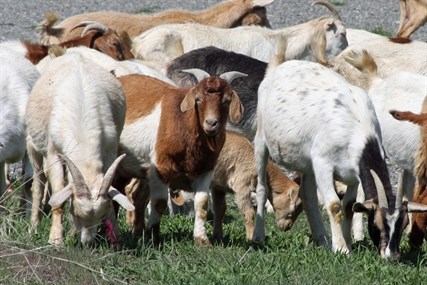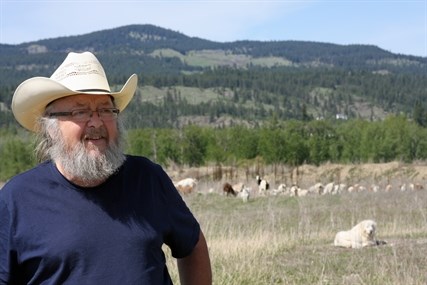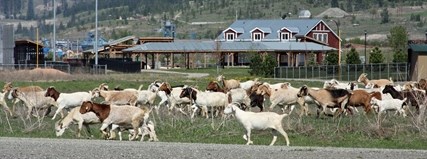
Goats can eat many weeds toxic to other animals, making them an ideal form of noxious weed control.
(JENNIFER STAHN / iNFOnews.ca)
May 02, 2013 - 12:34 PM
A herd of very hungry goats are being invited back to once again take part in the invasive weed control program at Kenna Cartwright Park.
A relatively new program in North America, weeding by way of goats has been popular in Europe for years. It has taken off in the United States and interest across Canada over the past couple of years has grown according to Conrad Lindblom, who owns the only weed-eating herd of goats for hire in Canada.
The work of Rocky Ridge Vegetation Control in Kamloops area has been featured in research papers, newspapers and television across the country and Lindblom is excited to see people take an interest in the safe and environmentally-friendly alternative.
“We're environmentalists, you know. We didn't want to damage the area (Kenna Cartwright Park). We adapted our grazing pattern, and even in heavily travelled areas there was no damage.”
Lindblom and wife Donna, of Beaverlodge, Alberta, have had goats for over 35 years as part of a multi-species grazing program. Lindblom says they began keeping goats in with their cattle to keep the weeds at bay allowing the grass to grow in stronger. Because each species was eating different vegetation it balanced out the pastures and reduced the need to purchase feed during the warmer months.
Almost 15 years ago the couple started taking a herd of 1,000 goats out to cut blocks to help keep weeds under control so smaller trees could survive. They were working in northern areas of Alberta and B.C. When they were contacted by the Southern Interior Weed Management Committee they took a look at the area the city wanted help with and agreed to a trial period.
“We were brought in for a 10-day trial period, and we just haven't left,” Lindblom says.
The Lindbloms have been staying at the Tournament Capital Ranch north of Rayleigh over the winter with the goats, their six dogs and three horses. The goats have thinned out the weeds there and many areas are showing no signs of the weeds returning, though the rancher does admit some areas could take as long as three years to get full results.
While Lindblom has had interest from other groups, he is hoping the city will extend the contract and is waiting to hear back from city staff before making a decision.
“We're trying for a three-year contract, but it's up to city council whether we stay or not.”
He says three-years will help ensure the best results, will allow expanded coverage of the parks and will enable them to set up a more permanent home base for the goats which they hope would become a training ground of sorts for others interested in goat weed control.
“And we like it here, the winter is shorter and we've made friends here” Lindblom says with a grin.
The integrated pest management coordinator for the city, Karla Hoffman, was instrumental in getting the city to agree to the program as a way to help control noxious weeds, specifically toadflax, in areas that are difficult to manage by hand-pulling, mowing or herbicides due to topography, vicinity to water, and size.
Coun. Arjun Singh says the program is innovative “because it is so old-fashioned. We sometimes forget that past practices often have enormous value.”
Hoffman says, “the goats have done a good job out there (Kenna Cartwright and Tournament Capital Ranch.) I'm amazed – I wasn't expecting the results we have gotten.”.
She also says interest since the goats started work on the initial 30-hectares has been phenomenal which has brought an awareness to the program. This is something she says has been fun to be part of as well.
“The goat-mowers are a great sustainability initiative,” Coun. Donovan Cavers noted earlier this week,” and like most environmental initiatives it has saved our city lots of money.”
Last year it cost the city about $10,000 for goat weed control program, or around $300 per hectare. This is about half to a third of what weed control by hand or chemical would cost.
Hoffman expects to know by next week just how much of a budget there will be for the goats and whether the herd will get to explore more of the city or just more of Kenna Cartwright.
Did you know?
- Goats are very smart and can be trained in the same way dogs can be; Lindblom's herd understands basic commands which he uses to turn them away from areas they are not allowed in or could be dangerous.
- They are animals of habit and will follow daily grazing plans, eating only certain things at different times of the day or season and will head back to their home base at the end of the day.
- Unlike cows that graze, goats are browsers – which means they move around a lot while eating instead of picking an area completely clean.
- A goat has four chambers in its stomach and food is stored until they are ready to eat it as cud.
- Goats eat about four pounds of food per day and a herd of 400 can clear out about 10 acres of weeds per day – depending on the vegetation.
- They enjoy eating fresh knapweed but also like to eat the seeds once the plant has dried out – this keeps the seed from spreading.
- Goats will eat many weeds and can digest 100 per cent of the plant, including the seeds.
- They are one of the few animals with 100 per cent digestion; rabbits also have the ability to completely break down its food.
- Goat poo makes great fertilizer; Lindblom notes the manure is a 70/30/90 (nitrogen/phosphorus/potassium) fertilizer with is equivalent to sheep manure.
- Goats are very adaptable and can live in cold and hot climates, as long as they have shelter from the elements.
- Goats can be very playful – Lindblom says if you give a goat a teeter-totter (or an unstable log) several will play on it for quite a while.
To contact a reporter for this story, email jstahn@infotelnews.ca or call (250) 819-3723.

Conrad Lindblom of Rocky Ridge Vegetation Control hopes to make the Tournament Capital Ranch north of Kamloops a permanent home for his goats.
(JENNIFER STAHN / iNFOnews.ca)

Conrad Lindblom and his dogs turn a herd of 400 goats away from the baseball diamonds at the Tournament Capital Ranch earlier this week.
(JENNIFER STAHN / iNFOnews.ca)
News from © iNFOnews, 2013